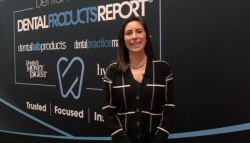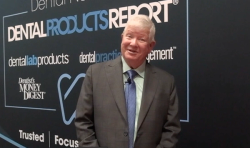- About Us
- Advertise
- Editorial
- Contact Us
- Terms and Conditions
- Privacy Policy
- Do Not Sell My Personal Information
© 2025 MJH Life Sciences™ and Dental Products Report. All rights reserved.
Getting that Bright Smile Just Right
More patients want to improve their look, and teeth whitening is an easy, effective way today to get them smiling more with a healthier mouth.
You thought you had a decent smile, but suddenly you are seeing it every day on a computer monitor along with friends and colleagues in video conferences.
Now, that decent smile appears as if it could be a little brighter and nicer. It doesn’t help any when you glance around and take a look at all the other smiles on your screen—ones that may appear perfect or at least whiter than yours.
The desire for a whiter smile is nothing new, but an increase in awareness and demand brought on by a pandemic was unexpected. Dental practices are reporting an increase in requests for whitening and other esthetic procedures. Another trend is whitening spas popping up in states that allow these procedures without requiring dentist supervision.
Shannon Pace Brinker, CDA, a member of the Dental Products Report® editorial advisory board, has long been a proponent of teeth whitening. She started one of the first online platforms designated for dental assistants, the Academy of Chairside Assisting®, and regularly works with a team on the evaluation of dental products and materials, not just whitening products.
Having worked as a practicing dental assistant for more than 30 years, Pace Brinker has seen in-office and take-home whitening products and lights come and go, along with many OTC offerings. She believes it is critical to have a dental professional oversee patient whitening to ensure best results and overall oral health. Just as important is making sure your patients are aware that you offer whitening.
“I thought everyone was going to be obsessed with their eyes, eyebrows, body and not care about their teeth because we’re all under masks,” she says. “Right now, more patients are getting their teeth whitened. So if you’re not offering it, talking about it, and letting them know you provide whitening services, you will miss out on a great opportunity.”
Do not assume your patients do not want or cannot afford whitening and other esthetic treatments, Pace Brinker warns.
“I feel like whitening it is the easiest, simplest thing that we can do. When you think about it, there are many products that we talk about in our practice that patients can get on their own; they can go somewhere else and buy at a grocery store or a convenience store. So why would we not think about what we can do to compete with that, especially since these patients trust us? So why not mention it and let our patients know that we provide those services?”
Marketing and awareness are critical. Companies like Ultradent Products, Philips, and SDI provide plenty of materials to help practices showcase their whitening capabilities, she says.
“I think people are scared about the marketing aspect of it,” Pace Brinker says. “Because of COVID-19, we don’t have visuals around the office. But let’s be honest, most [marketing] practices didn’t exist before COVID-19. So how can they say yes to whitening if they don’t know you offer it?”
When Pace Brinker first learned hair salons were offering teeth whitening, she was concerned the results might not be significant. More importantly, she wondered whether it was even legal. Many states do allow whitening services without supervision of a dentist, including her home state of Virginia. So after writing to the State Dental Board to confirm no conflicts, she has recently opened a whitening spa that allows her to provide the services to patients even when she’s not serving as a dental assistant inside a dental practice.
“I rented a suite inside of a salon and spa, Re’por Salon and Spa, and turned it into a real dental operatory. As a result, I have everything that I would need,” she says. “I have dental chairs, equipment, and even a Carestream Digital Scanner.”
“Everything has to be up to par for the state. But what is great about this is, I am a stickler, and I will not let patients come and do whitening unless they have had a cleaning within the past year [with their dentist],” says Pace Brinker, who at the time of this interview had treated 12 patients for whitening, 5 of whom she has referred to her dental practice for follow-up care. That last point underscores the importance of whitening in overall oral health and other esthetic opportunities for both patients and clinicians.
“That’s an eye-opener that goes back to the same message, that dentistry will come once you give patients what they were looking for—a nice smile,” she says. “I’m not here to be a competitor to the dentists. I’m here to utilize my practice for training other assistants, and it’s not about the money for me either. It’s doing it right, giving people what they hope they were getting, and at the end of the day, they [still] need restorative work, and that’s what I want them to go and do.”
She says it is not an issue of newer whitening spas taking patients away from practices. The opposite has happened a few times, including a recent incident when a patient in the dental practice for Invisalign care recognized Pace Brinker as her whitening provider. She then explained to her dentist that it was Pace Brinker who had referred the patient to the office for the Invisalign.
Products, Systems
There was a whitening boom more than a decade ago fueled in part by a popular television show called Extreme Makeover. Several companies were then offering in-house whitening lights as well as a variety of chairside whitening treatments and take-home whitening trays and materials.
At that time, there were plenty of studies done on effectiveness and some heated debates on whether some of these lights helped deliver better results. There also were concerns about sensitivity. Most of those light manufacturers are now gone. Today’s materials and delivery systems have improved so much that less time is needed to whiten teeth and issues with sensitivity and questionable lights have subsided. At the same time, numerous OTC whitening products are available, some of which make unsubstantiated claims. What we know is that patients want whitening, there are great products available, and professional supervision is a big plus in terms of getting best results, controlling sensitivity, and ensuring overall dental health is addressed.
James Wright, DDS, a Salt Lake City, Utah, solo practitioner, has seen an increase in demand from patients for whitening, especially among his older patients. He has always used whitening products from Utah-based Ultradent Products, Inc.
“It’s just me, a solo practitioner, so our clientele is a little bit older,” Dr Wright explains. “They are a little bit more interested in whitening. We do some custom trays, and we do a lot of the Opalescence Go™ trays because people like that convenience. They like to be able to put a tray in and not have to worry about how much [material] to put in, not have to worry about the cleanup. They put it in, take it out when they’re done and throw it away.”
Ultradent’s Opalescence Go prefilled whitening trays are available in 10% and 15% hydrogen peroxide formulas and feature a gel optimized for comfort. The prefilled trays can be worn right out of the package.
“It’s very simple and very convenient, and you can take it with you if you’re traveling,” he adds. “If you’re going to a meeting [and] you want to bleach a couple days beforehand or bleach right before, [because] it’s a prepackaged container, you can easily take it with you.”
He adds that Ultradent’s in-office power whitener Opalescence Boost™ is quite popular. It’s a chemically activated gel that provides brighter, whiter teeth after about an hour in the dental chair. The powerful 40% hydrogen peroxide gel is chemically activated, so it does not require a hot, uncomfortable light to work. Using a double-syringe configuration, the clinician activates the 40% hydrogen peroxide formula just prior to application, ensuring that the whitening is fresh and effective.
Dr Wright’s hygiene team is well versed in talking to patients about whitening. Additionally, as in many practices these days, patients talk about improving their smiles in part after having seen them so many times on computer screens.
“I think once [patients] have seen themselves on the screen, they realize they’re a little bit more close-up to individuals and they think I could do something about whitening,” he says. “It’s just a simple cosmetic adjustment, and it absolutely has gotten more economical over the years.”
As for the office’s marketing strategy, he says, there’s plenty of information about whitening on his practice website, but the key is a hygiene team trained to make patients aware of techniques and products. One message to make clear is that the days of painful sensitivity are in the past.
Because every patient is different, he has learned to mix and match some percentages to achieve the results desired by the patient, and some treatments do indeed take longer than others.
Another key, which is part of always having great communication with your patients, is to clearly explain the products and the systems and to know up front just what the patient expects to achieve from the whitening.
“They’re very happy with the results, but you know it’s really setting the expectation for the patient,” he says. “I ask, ‘What are you looking for? Because if you’re looking for the Chiclet white, let’s talk.’ That [very white Chiclet gum] is what some people want and we have to talk about what the expectations are, you know, what these products can actually do and so you have to be able to adapt to what your body will allow the whitening to do.
“Sensitivity can be managed. It has gone down because chemistries in the products have been added to help with that. But even with those who are sensitive, there are fluoride sensitive toothpastes that can be used to help minimize sensitivity,” Dr Wrightsays. “Again, if somebody’s sensitive then, you know, maybe you’re whitening 1 day and you give it a couple of days to come back again. You give it a couple days before they come back again, and you send them out with the Go trays or the custom trays. It’s very customizable.”
Dr Wright has worked closely with Ultradent and has often addressed concerns from fellow clinicians, some of which include complaints about patients’ results from doing whitening on their own. “You know, I handle a lot of customer concerns from clinicians for Ultradent, and I’m told often that it’s because they’re whitening on their own,” he says. “We always say, ‘Please, get a professional involved.’ It’s just good to have treatment being overseen.”
A New In-Office Option
Jonathan B. Levine, DMD, is a veteran cosmetic dentist and prosthodontist in New York, New York, who has been improving smiles for years. He was a pioneer in delivering porcelain veneers and has developed a unique method for whitening smiles. The cofounder of GLO Science has practiced dentistry 2 days a week for more than 20 years and used his extra time to teach, lecture, and develop products like the GLO Science whitening system, which features a G.L.O® Heat & LED Light Whitening Mouthpiece and 10 Teeth Whitening GLO Vials (10 x 2.95 mL). Combining professional-grade, patented heat and light technology with specially formulated gel to whiten teeth at home, this system offers fast, consistent results without an in-office light that may deliver too much heat and cause sensitivity, Dr Levine said.
“GLO Science is in about 4000 dental practices and the advantage of it is there’s an in-office answer without a big, cumbersome light,” he explains. “That’s more efficient and effective because all the lighting elements are built to decide a universally sized mouthpiece in the office and we use 30%. In three 8-minute passes you always get 5 shade changes. It’s really amazing. Even with tetracycline [staining], you can double and triple the regimen and there’s little to no sensitivity.” The company, which is about 10 years old now, also offers a Glo To Go Teeth Whitening Pen, mint whitening vials, and a GLO Lit Teeth Whitening Device Tech Kit With Bluetooth.
Like others, Dr Levine has witnessed an increased demand for brighter smiles. “That’s exactly what’s happened with COVID-19,” he says. “I’m very connected to a group, globally, and colleagues and specialists all say we have never been busier in 30 years. It’s because of a multitude of things. One is there’s a lot of backlog of people full of stress; they clench their teeth. They’re fracturing implants and crowns, and you have them looking at themselves all the time. They want whiter teeth on the screen and to look better.”
Although mandated closings of practices at the onset of the pandemic hurt many dentists financially, Dr Levine says the post-COVID-19 lessons have benefited the industry, leading to teledentistry platforms and new forms of technology to communicate with patients.
“It’s very interesting, the convergence of trends, and our technology today is better than ever,” he says. “Because of the backlog, the demand is high for men and women and, post COVID-19, dental practices and even the DSOs [dental service organizations] have really figured out how to navigate a COVID-19 world. For the DSOs with leadership, it’s an opportunity for us to look at our practices and reinvent ourselves and reimagine what our practices can be. This demand is here to stay. It’s very exciting for dentists…because of the technology.”
Innovative Methods
Although there may be fewer companies providing in-house lights and professional whitening materials, today’s offerings address patient desires and practice capabilities in innovative ways.
The Philips Zoom! whitening products have been around for a long time; technology and materials have evolved to the point where the company can provide safe, effective, professional whitening for all patient needs. Zoom! includes in-office, light-accelerated treatment that can whiten up to 8 shades in a single visit, but Philips also offers custom take-home kits and kits that can be delivered without the need to create a custom tray.
SDI offers an array of whitening products, including the Pola Light, an advanced tooth whitening system combining Pola’s award-winning whitening formulas with an LED mouthpiece designed to accelerate tooth whitening.
The Pola Light system comes with either Pola Day 9.5% hydrogen peroxide or Pola Night 22% carbamide peroxide gel, and it is easy and comfortable to use at home. The gels are fast acting and formulated to safely remove long-term stains in as little as 5 days. The high viscosity, neutral pH tooth whitening gel ensures patient comfort. The unique blend of soothers, conditioners, and high-water content also assists in reducing sensitivity.
Another company involved with whitening but using a different method is SmileFy. This software company offers technological solutions to make it easier, faster, and better for dental professionals to deliver beautiful, predictable results. SmileFy’s artificial intelligence technology is designed to make digital workflows more intuitive for the practitioner.
By combining extensive research into a simple-to-use tool that creates an unparalleled experience in esthetic treatment planning for dentist and patient, the company can show patients just how a whiter smile or other cosmetic procedures can look, and the process is designed to improve the quality of treatment planning, results, and communication.
If a patient can clearly see just how nice their smile can become, the chances of accepting the treatments rise dramatically.
Additionally, manufacturer of Invisalign, Align, just announced an agreement with Ultradent to create a professional whitening system that can be utilized with Align’s Invisalign aligners and Vivera retainers. In this partnership, Invisalign-trained dentists will be offered a professional whitening system with Opalescence PF whitening formula from Ultradent.
This formula is optimized for Invisalign clear aligners and will be called the “Invisalign Professional Whitening System – powered by Opalescence.” It is formulated to deliver optimal whitening outcomes. This innovation comes from the patients’ desire to whiten teeth during Invisalign treatment, Align says.
Individuals today are looking more at their smiles. This is great news for the practitioner. There are effective whitening solutions out there and patients looking for help in making their smiles brighter and happier.

 Download Issue: Dental Products Report October 2021
Download Issue: Dental Products Report October 2021

